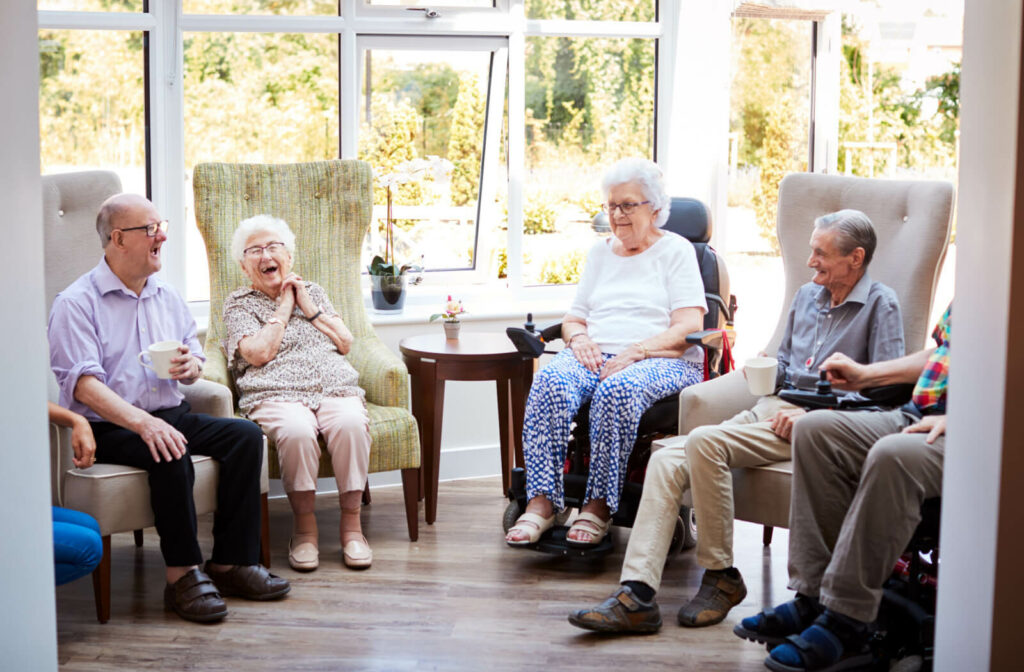When a loved one needs a little help with daily life, it may be time to consider moving to a senior living community. But there’s more than one type of senior living, and each community has its own benefits. Two of the more common types are memory care and assisted living, but what’s the difference between them?
Memory care is designed to support older adults dealing with memory impairment or cognitive decline. Meanwhile, assisted living, often called “personal care,” is designed for older adults who want to prioritize their independence while still getting help with the daily tasks that cause them trouble.
What Is Memory Care?
What do you do when a loved one has dementia? Or when they have any neurodegenerative disorder that starts to affect their everyday life? These conditions can all have long-term effects on a person’s life and can be difficult to manage alone.
If this sounds familiar, it’s time to consider memory care. Memory care is a specialized form of senior living designed specifically for older adults with conditions like dementia, Alzheimer’s, Parkinson’s, or any other form of memory impairment or loss of cognitive function.
These communities are designed to accommodate these unique and challenging conditions to promote a higher quality of life that can be difficult to achieve otherwise. These memory care communities aim to support your loved one with everyday challenges while slowing cognitive decline and creating a nurturing environment that helps maintain your loved one’s dignity.
This is done with:
- A safe and secure environment designed to accommodate your loved one’s condition
- Specialized therapies, programs, and activities to support cognitive health and function
- A specially-trained staff with experience in supporting older adults with memory impairment
- Round-the-clock care
- Structured routines
They’re an excellent way to get a loved one the care they need without compromising their quality of life.
Signs a Loved One Needs Memory Care
So, how can you tell if a loved one needs memory care? Dementia and other types of memory impairment can be extremely complicated conditions, and they may develop without any noticeable symptoms.
It can help to look for:
- Frequent forgetfulness
- Agitation
- Signs of depression or anxiety
- Difficulty with daily tasks
- Trouble with spatial awareness
- Frequent wandering or getting lost
- Difficulty with daily tasks such as dressing, eating, and personal care
- Trouble with spatial awareness and navigation
- Unexplained mood changes and irritability
- A decline in hygiene habits
If you’ve noticed any of these symptoms in a loved one, it may be time to consider memory care.
What Is Assisted Living?
While memory care can be an excellent choice to get your loved one the care they need, it isn’t the only type of senior living available. So, what do you do if your loved one doesn’t have some form of memory impairment or cognitive decline but still needs some help in their day-to-day life?
If that sounds familiar, assisted living, also called personal care, may be right for your loved one. This type of senior living is designed for older adults who need some help in their daily routine, but not to the extent that they need full-time or around-the-clock medical care.
Personal care strikes a balance between senior care and remaining independent. These communities strongly emphasize independence and autonomy while helping every resident get the care they need.
This is done by:
- Creating a customized care plan tailored to every resident’s unique situation
- Offering a wide range of fulfilling and engaging services and experiences
- Meal plans and dining options
- Fitness and wellness programs
- Emergency response
In personal care, your loved one gets access to what they need to maintain a higher quality of life. Whether they need a hand with dressing, bathing, managing medication, cleaning their home, or getting around, personal care can be an excellent approach to supporting your loved one in a way that truly matters—all while retaining their independence and autonomy.
How to Tell if a Loved One Needs Assisted Living
Understanding whether or not your loved one could benefit from assisted living is the first step toward getting them the care they need. Try to keep an eye out for:
- Increasing difficulty in performing daily living activities such as bathing, dressing, and eating
- Decreased mobility or fear of falling
- Noticeable weight loss or gain, possibly due to difficulty in cooking or lack of interest in eating
- A decline in maintaining the home, leading to untidiness or unsafe living conditions
- Social withdrawal or a noticeable decrease in interest in hobbies and activities
- Managing medications becomes challenging, leading to health concerns
- Frequent memory lapses, though not severe enough to warrant memory care
If you notice any of these signs, it may be time to discuss a move to personal care.
The Key Difference Between Memory Care & Assisted Living
So, how do you choose between memory care and assisted living? It starts with an assessment of your loved one’s health. It can help to determine:
- Their cognitive function and abilities
- Their overall health
- What type of support they may need
- Whether or not they showcase any symptoms of dementia
- Whether or not they need round-the-clock medical support
Remember: memory care is designed specifically to address the challenges posed by dementia or memory impairment, while assisted living focuses on maintaining your loved one’s independence. If you’re still unsure of what type of care can help your loved one, it can be beneficial to speak with a healthcare professional for a proper assessment of their health—or visit potential senior living communities ahead of time and ask for their advice.

Senior Care in Woodstock
If you have a loved one that needs support, contact us at Bellevue Village at Neese Road. Our team is here for you and your family, and we offer both memory care and personal care services. Schedule a visit with our community today, and take the first step toward getting your loved one the care they deserve in a community that truly feels like home!


